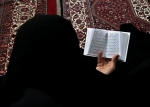02 March 2010
‘Descendants of Mohammed’ Confront Newspapers Over Cartoons, Demanding Apologies and Eyeing Lawsuits
(CNSNews.com) – After securing an apology from one Danish newspaper for publishing a cartoon satirizing Mohammed, a Saudi lawyer now plans to confront another 15 newspapers, filing lawsuits against them if necessary.
Faisal Yamani says he is acting on behalf of eight Muslim organizations representing “descendants of Mohammed.”
He told the Danish tabloid B.T. that he has 15 newspapers in his sights. His clients have made it clear they are ready to finance a campaign of lawsuits if the papers refuse to follow the example of the liberal daily Politiken and apologize. Yamani did not say how much he would aim to extract from the media organizations but referred to “a long and very expensive legal action.”
On Friday, Politiken published a formal apology to “anyone who was offended” by its decision to reproduce one of the 12 cartoons which triggered an international furor after another Danish paper, Jyllands-Posten, first published them in September 2005.
Politiken editor Toeger Seidenfaden said his paper had not published the sketch “as a statement of editorial opinion or values but merely as part of the newspaper’s news coverage.”
“It was never Politiken’s intention to offend Muslims in Denmark or elsewhere.”
In a joint statement with Yamani, the newspaper said that the Saudi lawyer’s clients had as a result of the apology now agreed “not to pursue any legal or administrative action against Politiken.”
The cartoon printed by Politiken was the one depicting a man wearing a turban shaped like a bomb with its fuse lit, drawn by cartoonist Kurt Westergaard.
Among the others, submitted by various artists, one showed “Mohammed” with eyes blacked out and carrying a large, curved knife, flanked by two burqa-clad women, while another depicted him telling a line of suicide bombers seeking entry to paradise: “Stop, stop, we have run out of virgins.” A more benign interpretation portrayed a man in white with a beard, a stick and a donkey.
The original appearance of the cartoons drew scant attention but after Danish Muslim clerics toured the Arab world to drum up reaction, protests erupted.
Muslims consider any images of the 7th century founder of their religion to be blasphemous. The association with terrorism and extremism further fueled the anger.
Protests were held in many Muslim nations, and in Nigeria, Libya and Afghanistan they turned deadly. Danish goods were boycotted in some Mideast countries, and the Organization of the Islamic Conference (OIC) used the issue to escalate its campaign at the United Nations aimed at outlawing the “defamation” of Islam.
Over time the protests ebbed, but after a plot was uncovered in 2008 to murder Westergaard, the turban cartoon was reprinted widely again in a show of solidarity. It was at this time that Politiken published it.
Its decision now to offer an apology drew strong criticism in Denmark, with Prime Minister Loekke Rasmussen saying he was troubled by the breaking of ranks.
“If this is an expression of breaking the unity that has existed among Danish newspapers and in Danish society, it is a matter of serious, serious concern,” he said. “If this is a question of bowing to a threat in order to avoid a court case, I am also concerned.”
Foreign Minister Lene Espersen said Danish newspapers should “stick together when they are met with threats.”
Westergaard was quoted as saying the decision amounted to giving in to the fear of terror, and Jyllands-Posten editor Jorn Mikkelsen, said it marked a “sad day for Danish media, for freedom of speech and for Politiken.”
Yamani, who is a partner in the Jeddah-based law firm Ahmed Zaki Yamani, approached 11 Danish newspapers several months ago on behalf of his clients. No other paper has yet publicly agreed to the proposed apology agreement.
Yamani claims to be representing eight organizations, based in Egypt, Saudi Arabia, Lebanon, Libya, Qatar, Jordan, Australia and the Palestinian self-rule territories. He says they comprise 94,923 descendants of Mohammed.
The main client is the Cairo-based Union of Al-Ashraf (Niqabat al Ashraf), which says it has more than 80,000 registered members. Ashraf (plural of Sharifs) are Muslims claiming direct lineage to Mohammed via Fatima, the daughter from the first of his multiple marriages.
Queries sent to the organization’s president, Mahmoud el-Sharif, brought no response.
‘Deeply hurt’
In a statement reacting to the apology by Politiken, an OIC spokesman said 1.5 billion Muslims had “felt humiliated, insulted and deeply hurt by the publication of the cartoons.” The organization hoped the apology would be replicated by other newspapers involved and by the cartoonists
He said the OIC was “strongly committed to freedom of expression but believes that it should be exercised responsibly so as not to create incitement and provocation leading to social unrest and disturb interfaith harmony.”
Writing on a Web site of Britain’s Daily Telegraph, Douglas Murray, the director of the Centre for Social Cohesion – a think tank focusing on extremism in Britain – said the apology “epitomizes one of the most aggravating trends currently being accepted, which is the notion that Muslims somehow have deeper feelings than the rest of the world.”
“Most of us regularly have our deepest feelings trodden upon, not least by the expressions of bigoted Muslim attitudes,” he wrote. “But we don’t burn things, we don’t intimidate people, and we don’t force apologies out of newspapers for offence caused. Because we recognize that being offended is part of being a grown up in a free society.
“The sooner more Muslims learn that the better.”
15:39 Posted in EUROPE | Permalink | Comments (0) | ![]() Facebook |
Facebook |




















The comments are closed.